
Alina Oprea is an Associate Professor at Northeastern University in the Khoury College of Computer Sciences. She joined Northeastern University in Fall 2016 after spending 9 years as a research scientist at RSA Laboratories. Her research interests are broadly in cyber security, with a focus on machine learning security and privacy, threat detection, and cloud security. She is the recipient of the Technology Review TR35 award for research in cloud security in 2011 and the recipient of the Google Security and Privacy Award in 2019. Alina is currently a Visiting Faculty Researcher in the Federated Learning team at Google Research.
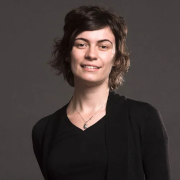
Anca Dragan is an associate professor in the EECS Department at UC Berkeley. Her goal is to enable robots (and AI agents more broadly) to work for and around people. She runs the InterACT laboratory, where she focuses on algorithmic human-robot interaction: algorithms that move beyond the robot’s function in isolation and generate robot behavior that coordinates well with human actions and is aligned with what humans actually want the robot to do. Anca received her Ph.D. from Carnegie Mellon University’s Robotics Institute. She helped found the Berkeley AI Research Laboratory, and is co-principal investigator of the Center for Human-Compatible AI. She has been honored by the Presidential Early Career Award for Scientists and Engineers (PECASE), NSF CAREER, Sloan, Okawa, ONR Young Investigator Award, MIT TR35, and the IEEE RAS Early Academic Career Award.
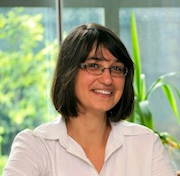
Ani Nenkova is a Principal Scientist at Adobe Research. Prior to joining Adobe in 2021, she was a tenured faculty member at the Computer and Information Science Department of the University of Pennsylvania. Dr. Nenkova obtained her doctoral degree in computer science from Columbia University and completed her postdoctoral training at the linguistics department of Stanford University. Ani Nenkova’s work is broadly in the areas of artificial intelligence and language technology, with focus on summarization, text quality and discourse and information extraction. Her highly visible research has been published at the top venues of the field and has been recognized with best student paper awards at SIGDIAL 2011, EMNLP-CoNLL 2012 and the AMIA Informatics Summit 2021. Dr. Nenkova has been an engaged member of the Association for Computational Linguistics (ACL) for over two decades, consistently serving as reviewer and (senior) area chair, workshop organizer and panelist at ACL events. Dr. Nenkova was a board member and in 2020 a president of SIGDAT, the ACL special interest group responsible for the organization of the EMNLP conference. In 2016 she was a program co-chair for the NAACL conference; she has served as an editor-in-chief for Transactions of ACL (TACL) since 2019.
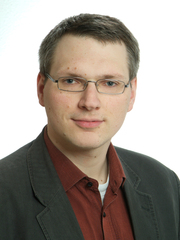
Björn Brandenburg is a tenured faculty at the Max Planck Institute for Software Systems (MPI-SWS) in Kaiserslautern, Germany, and head of the Real-Time Systems Group. Prior to joining MPI-SWS, he obtained his PhD under the supervision of Jim Anderson in 2011 and his MSc in 2008, both at the University of North Carolina at Chapel Hill. His work is supported by an ERC Starting Grant and has been recognized with three dissertation awards, several best-paper awards (including at RTSS, RTAS, ECRTS, and EMSOFT), and the inaugural SIGBED Early Career Award in 2018. His current research interests are centered on the design, implementation, and analysis of predictable multiprocessor real-time operating systems and the establishment of a foundation for trustworthy, machine-checked proofs of temporal correctness.
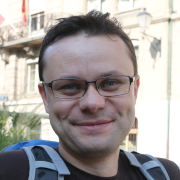
Catalin Hritcu is a tenured faculty at the Max Planck Institute for Security and Privacy (MPI-SP, Bochum) and head of the Formally Verified Security group. He is interested in formal methods for security (secure compilation, compartmentalization, memory safety, crypto protocols, information flow), programming languages (program verification, proof assistants, dependent types, formal semantics, property-based testing), and the design and verification of security-critical systems (compilation chains, reference monitors, tagged architectures). He was awarded an ERC Starting Grant on formally secure compilation and was also involved in the design of the F* verification system. His research received Distinguished Paper Awards at the Computer Security Foundations (CSF) symposium in 2019 and 2021. Catalin serves as Steering Committee Chair for the Certified Programs and Proofs (CPP) conference and the Principles of Secure Compilation (PriSC) workshop. He was PC and Conference Chair of CPP 2020 and 2021, PC Chair of PriSC 2018, General Chair of the European Symposium on Security and Privacy (EuroS&P) held in Paris in 2017, and organizer for two Dagstuhl Seminars on Secure Compilation in 2018 and 2021. Before joining MPI-SP, Catalin was a Tenured Researcher at Inria Paris, a Visiting Researcher at Microsoft Research, and a PostDoc at University of Pennsylvania. He received a PhD from Saarland University and a Habilitation from ENS Paris.
 Katharina Reinecke is an Associate Professor at the Paul G. Allen School of Computer Science & Engineering at the University of Washington where she researches and teaches human-computer interaction and computing ethics. Her research explores how people’s interaction with digital technology varies depending on their cultural, geographic, or demographic background and how technology can be biased against people who are unlike the small groups of people that created it. Her lab has developed a number of approaches and systems that make technology better suitable for diverse user groups and that can help designers and developers anticipate unintended consequences of technology. Katharina is a co-founder of LabintheWild, a virtual lab for conducting large-scale behavioral studies with diverse participants, and of Augury Design Inc., a startup that predicts the success of website designs based on LabintheWild data. Katharina received a Ph.D. in Computer Science from the University of Zurich and was a postdoctoral fellow at Harvard University. Prior to joining the University of Washington, she was an Assistant Professor in the School of Information at the University of Michigan.
Katharina Reinecke is an Associate Professor at the Paul G. Allen School of Computer Science & Engineering at the University of Washington where she researches and teaches human-computer interaction and computing ethics. Her research explores how people’s interaction with digital technology varies depending on their cultural, geographic, or demographic background and how technology can be biased against people who are unlike the small groups of people that created it. Her lab has developed a number of approaches and systems that make technology better suitable for diverse user groups and that can help designers and developers anticipate unintended consequences of technology. Katharina is a co-founder of LabintheWild, a virtual lab for conducting large-scale behavioral studies with diverse participants, and of Augury Design Inc., a startup that predicts the success of website designs based on LabintheWild data. Katharina received a Ph.D. in Computer Science from the University of Zurich and was a postdoctoral fellow at Harvard University. Prior to joining the University of Washington, she was an Assistant Professor in the School of Information at the University of Michigan.
 Manuel Gomez Rodriguez is a tenured faculty at the Max Planck Institute for Software Systems (MPI-SWS). His research interests lie in the development of human-centric machine learning models and algorithms. He has co-authored over 50 publications in top-tier conferences (NeurIPS, ICML, UAI, AISTATS, AAAI, KDD, WWW) and journals (PNAS, Nature Communications, JMLR, TMLR). Manuel is an ELLIS Fellow and has received several recognitions for his research, including an ERC Starting Grant, an outstanding Paper Award at NeurIPS and a Best Research Paper Honorable Mention at KDD and WWW. He has served as Track Chair for FAccT 2020, Workshop Chair at ICML 2022 and as Area Chair and/or Senior Area Chair for every major conference in machine learning, data mining and the Web. He is also an Action Editor for JMLR. Manuel holds a M.S. and a Ph.D. in Electrical Engineering from Stanford University (2009 and 2013) and a B.S. in Electrical Engineering from University Carlos III in Madrid, Spain (2006).
Manuel Gomez Rodriguez is a tenured faculty at the Max Planck Institute for Software Systems (MPI-SWS). His research interests lie in the development of human-centric machine learning models and algorithms. He has co-authored over 50 publications in top-tier conferences (NeurIPS, ICML, UAI, AISTATS, AAAI, KDD, WWW) and journals (PNAS, Nature Communications, JMLR, TMLR). Manuel is an ELLIS Fellow and has received several recognitions for his research, including an ERC Starting Grant, an outstanding Paper Award at NeurIPS and a Best Research Paper Honorable Mention at KDD and WWW. He has served as Track Chair for FAccT 2020, Workshop Chair at ICML 2022 and as Area Chair and/or Senior Area Chair for every major conference in machine learning, data mining and the Web. He is also an Action Editor for JMLR. Manuel holds a M.S. and a Ph.D. in Electrical Engineering from Stanford University (2009 and 2013) and a B.S. in Electrical Engineering from University Carlos III in Madrid, Spain (2006).
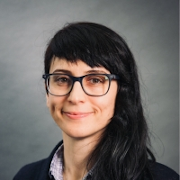 Manya Ghobadi is faculty in the EECS department at MIT. Her research spans different areas in computer networks, focusing on optical reconfigurable networks, networks for machine learning, and high-performance cloud infrastructure. Manya received her Ph.D. from the University of Toronto and spent a few years at Microsoft Research and Google prior to joining MIT.
Manya Ghobadi is faculty in the EECS department at MIT. Her research spans different areas in computer networks, focusing on optical reconfigurable networks, networks for machine learning, and high-performance cloud infrastructure. Manya received her Ph.D. from the University of Toronto and spent a few years at Microsoft Research and Google prior to joining MIT.
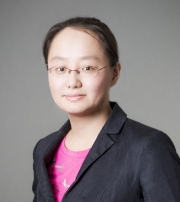 Minlan Yu is a Gordon McKay professor at Harvard School of Engineering and Applied Science. She received her B.A. in computer science and mathematics from Peking University and her M.A. and PhD in computer science from Princeton University. She has actively collaborated with companies such as Google, AT&T, Microsoft, Facebook, and Intel. Her research interests include data networking, distributed systems, enterprise and data center networks, and software-defined networking. She received the ACM-W rising star award, NSF CAREER award, and ACM SIGCOMM doctoral dissertation award. She served as PC co-chair for NSDI, HotNets, and several other conferences and workshops.
Minlan Yu is a Gordon McKay professor at Harvard School of Engineering and Applied Science. She received her B.A. in computer science and mathematics from Peking University and her M.A. and PhD in computer science from Princeton University. She has actively collaborated with companies such as Google, AT&T, Microsoft, Facebook, and Intel. Her research interests include data networking, distributed systems, enterprise and data center networks, and software-defined networking. She received the ACM-W rising star award, NSF CAREER award, and ACM SIGCOMM doctoral dissertation award. She served as PC co-chair for NSDI, HotNets, and several other conferences and workshops.
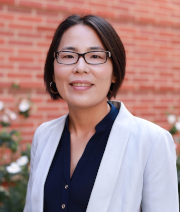 Miryung Kim is a Professor and Vice Chair of Graduate Studies in the Department of Computer Science at UCLA. She has taken a leadership role in defining the emerging area of software engineering for AI. Her current research focuses on software developer tools for big data systems and heterogeneous computing. Her group created automated testing and debugging for Apache Spark and conducted the largest scale study of data scientists in industry. She was a Program Co-Chair of ESEC/FSE 2022. She was a Keynote Speaker at ASE 2019 and a Distinguished Speaker at UIUC, UMN, and UC Irvine. She received NSF CAREER award, 10 Year Most Influential Paper Award ICSME, ACM SIGSOFT Distinguished Paper Award, Okawa Foundation Award, Google Faculty Award, Microsoft Software Engineering Innovations Foundation Award, and Humboldt Fellowship. She produced 6 professors (Columbia, Purdue, two at Virginia Tech, etc). For her impact on nurturing the next generation of academics, she received the ACM SIGSOFT Influential Educator Award.
Miryung Kim is a Professor and Vice Chair of Graduate Studies in the Department of Computer Science at UCLA. She has taken a leadership role in defining the emerging area of software engineering for AI. Her current research focuses on software developer tools for big data systems and heterogeneous computing. Her group created automated testing and debugging for Apache Spark and conducted the largest scale study of data scientists in industry. She was a Program Co-Chair of ESEC/FSE 2022. She was a Keynote Speaker at ASE 2019 and a Distinguished Speaker at UIUC, UMN, and UC Irvine. She received NSF CAREER award, 10 Year Most Influential Paper Award ICSME, ACM SIGSOFT Distinguished Paper Award, Okawa Foundation Award, Google Faculty Award, Microsoft Software Engineering Innovations Foundation Award, and Humboldt Fellowship. She produced 6 professors (Columbia, Purdue, two at Virginia Tech, etc). For her impact on nurturing the next generation of academics, she received the ACM SIGSOFT Influential Educator Award.
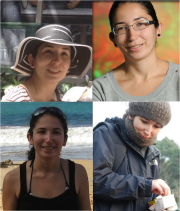 Necmiye Ozay received her B.S. degree from Bogazici University, Istanbul in 2004, her M.S. degree from the Pennsylvania State University, University Park in 2006 and her Ph.D. degree from Northeastern University, Boston in 2010, all in electrical engineering. She was a postdoctoral scholar at the California Institute of Technology, Pasadena between 2010 and 2013. She joined the University of Michigan, Ann Arbor in 2013, where she is currently an associate professor of Electrical Engineering and Computer Science, and Robotics. Dr. Ozay’s research interests include hybrid dynamical systems, control, optimization and formal methods with applications in cyber-physical systems, system identification, verification & validation, autonomy and dynamic data analysis. Her papers received several awards. She has received the 1938E Award and a Henry Russel Award from the University of Michigan for her contributions to teaching and research, and five young investigator awards, including NSF CAREER, DARPA Young Faculty Award, ONR Young Investigator Award, and NASA Early Career Faculty Award. She is also a recent recipient of the Antonio Ruberti Young Researcher Prize from the IEEE Control Systems Society for her fundamental contributions to the control and identification of hybrid and cyber-physical systems.
Necmiye Ozay received her B.S. degree from Bogazici University, Istanbul in 2004, her M.S. degree from the Pennsylvania State University, University Park in 2006 and her Ph.D. degree from Northeastern University, Boston in 2010, all in electrical engineering. She was a postdoctoral scholar at the California Institute of Technology, Pasadena between 2010 and 2013. She joined the University of Michigan, Ann Arbor in 2013, where she is currently an associate professor of Electrical Engineering and Computer Science, and Robotics. Dr. Ozay’s research interests include hybrid dynamical systems, control, optimization and formal methods with applications in cyber-physical systems, system identification, verification & validation, autonomy and dynamic data analysis. Her papers received several awards. She has received the 1938E Award and a Henry Russel Award from the University of Michigan for her contributions to teaching and research, and five young investigator awards, including NSF CAREER, DARPA Young Faculty Award, ONR Young Investigator Award, and NASA Early Career Faculty Award. She is also a recent recipient of the Antonio Ruberti Young Researcher Prize from the IEEE Control Systems Society for her fundamental contributions to the control and identification of hybrid and cyber-physical systems.
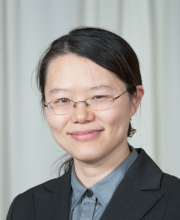 Shan Lu is a Professor in the Department of Computer Science at the University of Chicago. Her research focuses on software reliability and efficiency. She is an ACM Distinguished Member (2019 class) and an Alfred P. Sloan Research Fellow (2014). Her co-authored papers have won Most Influential Paper Award at ASPLOS (2022), Best Paper Awards at SOSP (2019), OSDI (2022 & 2016), FAST (2013), Distinguished Paper Awards at ICSE (2019 & 2015) and FSE (2014), an CHI Honorable Mention Award (2021), an SIGPLAN Research Highlight Award at PLDI (2011), and an IEEE Micro Top Picks in ASPLOS (2006). Shan currently serves as the Chair of ACM-SIGOPS.
Shan Lu is a Professor in the Department of Computer Science at the University of Chicago. Her research focuses on software reliability and efficiency. She is an ACM Distinguished Member (2019 class) and an Alfred P. Sloan Research Fellow (2014). Her co-authored papers have won Most Influential Paper Award at ASPLOS (2022), Best Paper Awards at SOSP (2019), OSDI (2022 & 2016), FAST (2013), Distinguished Paper Awards at ICSE (2019 & 2015) and FSE (2014), an CHI Honorable Mention Award (2021), an SIGPLAN Research Highlight Award at PLDI (2011), and an IEEE Micro Top Picks in ASPLOS (2006). Shan currently serves as the Chair of ACM-SIGOPS.
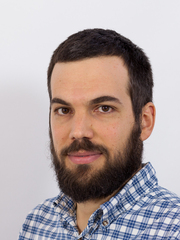 Viktor Vafeiadis got his BA (2004) and PhD (2008) from the University of Cambridge, and is currently a tenured faculty at MPI-SWS, where he is working on the semantics and verification of concurrent and persistent programs. He has been awarded the ACM SIGPLAN John C. Reynolds Doctoral Dissertation Award (2008), the ACM SIGPLAN Robin Milner Young Researcher Award (2022), and an ERC Consolidator Grant (2020).
Viktor Vafeiadis got his BA (2004) and PhD (2008) from the University of Cambridge, and is currently a tenured faculty at MPI-SWS, where he is working on the semantics and verification of concurrent and persistent programs. He has been awarded the ACM SIGPLAN John C. Reynolds Doctoral Dissertation Award (2008), the ACM SIGPLAN Robin Milner Young Researcher Award (2022), and an ERC Consolidator Grant (2020).
